[Article edited 6/19/18]
At the start of the year, we published Trends for 2018: The Upside-Down, Tech Reckoning, Time’s Up, Citizenship on Forbes.com. To read the full report, click here.
We’re digging into each one of these topics as the year progresses in order to watch the evolution of these trends and see what we can learn about who we are and what’s going to happen next. This post takes another look at Trend #3 Tech Reckoning
Tech Reckoning
When we wrote about this trend in January we were covering the exponential growth and mind-blowing tech innovation in all areas of life. But then things changed. Talk about a Tech Reckoning!
Here are just two of the many events changing the landscape and dominating the news cycles:
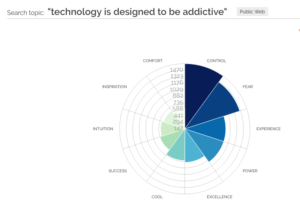
- Addictive properties are designed into social media as a steady drip of “likes” and retweets — just enough to keep us hooked. Our values analysis shows that this issue is in fact about being controlled, and our fear of what that might mean for us. We may love our social media, but no one likes being tricked—and now hacked and robbed.
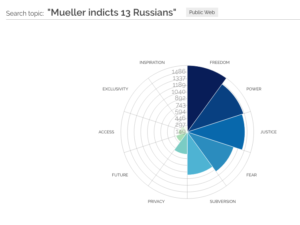
- The very real social media manipulation of the 2016 election. Special investigator Robert Mueller indicts 13 Russians over interference in the 2016 presidential election on Friday February 16th was a jaw dropper for everyone. Mueller indicts 13 Russians- values. We see our freedoms being threatened, the struggle for power playing out, and the demand for justice as we battle our sense of fear for what may be next.
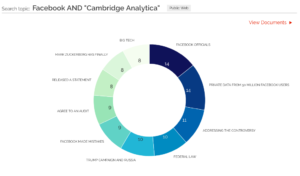
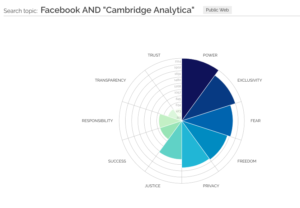
Then the Cambridge Analytica story hit and the Facebook business model is laid bare. If we thought Facebook was a free, benign, happy platform for sharing pictures of perfect children, vacations and life, we don’t anymore. The reality is that a Facebook app grabbed millions of user’s data, and their friend’s data and used it to micro target political ads. Wow. The concepts analysis shows the many spokes of the story and the values show us that this all about power and who has it to get what they want.
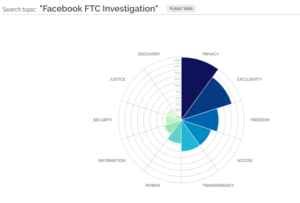
Then it got real. Mark Zuckerberg testified before Congress and the FTC is now investigating Facebook. The analysis shifts showing values at the heart of this and the bigger issue– privacy. How are these big companies going to protect users, society and democracy. Facebook is not alone. This is going to entangle Google and Twitter too. And that’s not to mention the fury building in Europe.
Great Quote
“If you aren’t already worried about how your personal data is being used, now would be a good time to start. “The way I like to think of it, data is the electricity of our new economy, and electricity can be quite dangerous,” he said. “We enjoy the benefits of electricity, despite the fact that it can literally kill you.””- Former Cambridge Analytica contractor and whistleblower, Christopher Wylie, testifying in the House of Commons, Big Think, 3.28.18
Despite the cultural drama, Facebook – at least as of June 2018 – has come through the scandal relatively unmarked. Stocks dipped for a bit, then climbed once again. Some data even showed that Facebook usage increased after the Cambridge Analytica scandal.
On the other hand, government – though not the American one – has started putting up some guardrails to limit technology’s reach. In Europe the General Data Protection Regulation puts a little more control and a little more knowledge in the hands of users. Tech companies doing business with European consumers will need to be clear about their data practices, not bury them.
What this means for business
Not only are consumers starting to finally understand the ramifications of giving up so much data, this has far reaching implications – not the least of which is this will enact a change in the way companies approach consumers, and the way consumers allow themselves to trust companies.
Dov Seidman quoted in Tom Friedman’s column on March 27, “In the fused world the business of business is no longer just business. The business of business is now society. And, therefore, how you take or don’t take responsibility for what your technology enables or for what happens on your platforms is inescapable. This is the emerging expectation of users — real people — who’ve entrusted so much of their inner lives to these powerful companies.”
Silicon Valley has created a monster and we’ve been unwitting participants.
The questions are many. Will Silicon Valley solve this? What do these revelations mean for our future elections? How will we know if anything is true or accurate if it can be manufactured so easily? On the other hand, will anyone even care? Facebook’s made dozens of missteps on its path toward world domination, and despite many privacy maelstroms, they came through each episode relatively unfazed. Despite these facts, with trust already at an all time low, business will eventually have a lot to answer for.

